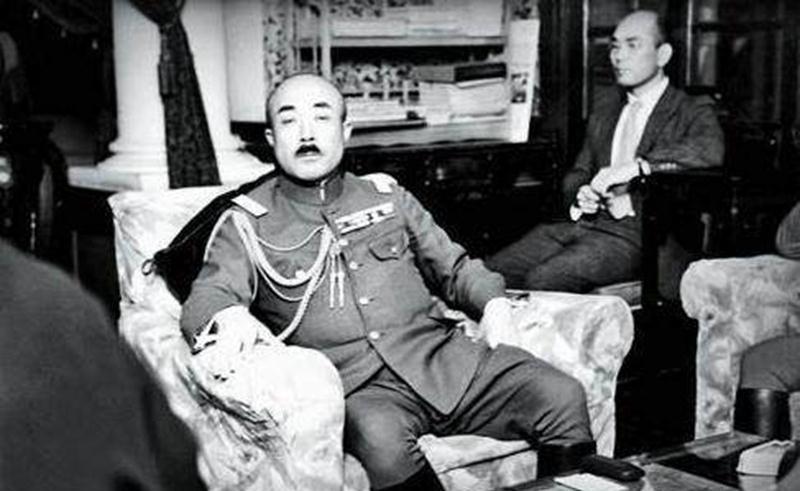Sometimes, the Fall is not as difficult as everyone thinks, and good and evil are often transformed in an instant. The person who is still a hero of the anti-Japanese resistance one second is likely to become the scum of the nation the next. This is the case with the man I want to take to know today, he was a heroic patriotic warrior, but later he became a traitor to the country, and his name was Pang Bingxun.

Pang Bingxun was born in 1879, a native of Xinhe, Hebei Province, to a poor family. In order to make a living, Pang Bingxun, an adult, joined the army and entered the Qing army as a surveyor. After the Xinhai Revolution, Pang Bingxun returned to his hometown to do business and started a small business in his hometown. Until 1920, when he was 41 years old, his hometown of Hebei had a disaster, the people were not happy, in order to make a living, Pang Bingxun once again enlisted in the army.
This time Pang Bingxun joined the troops of the immediate warlord Sun Yue, although he was a little older, but he was shrewd and capable, and he had read books, and he performed prominently on the battlefield, so he was quickly promoted, and gradually became the chief of staff of the mixed brigade from an ordinary soldier.
At that time, the warlords fought for many years, and Pang Bingxun gave full play to the shrewdness of his merchants, attached himself to various forces, and joined Feng Yuxiang's Northwest Army during the Central Plains War, following Feng Yuxiang to rebel against Chiang Kai-shek. However, Pang Bingxun was extremely good at preserving strength, did not contribute to the Central Plains War, and took the opportunity to develop himself. After the Battle of the Central Plains, Pang Bingxun was absorbed by Chiang Kai-shek and appointed commander of the First Infantry Division. Soon after, Pang Bingxun was appointed commander of the Forty Army.
In 1937, after the outbreak of the Anti-Japanese War, Pang Bingxun led his troops to the anti-Japanese battlefield. In the war against Japan, his best performance was the Battle of Linyi. At that time, the enemy army held heavy weapons, in the eyes of outsiders, this is a battle that Pang Bingxun must lose, but Pang Bingxun was stunned to fight with the Japanese army, and the Japanese army failed to break through the defense line in three bloody battles, since then, Pang Bingxun's name has become louder and louder, and in 1939 he was promoted to commander-in-chief of the 24th Group Army.
However, such a mighty anti-Japanese famous general defected to the enemy in 1942 and became a traitor. At that time, Pang Bingxun's troops were stationed in the Taihang Mountains, because of the large-scale sweep of the Japanese army, Pang Bingxun was unfortunately left alone, he hid in a hidden cave on the mountain did not dare to come out, who knew that Sun Dianying, who had surrendered to the enemy, found him, Pang Bingxun had no way to retreat, and could only choose to surrender to the Japanese as a traitor.
So, after the victory of the War of Resistance Against Japan, what happened to Pang Bingxun? After the victory of the War of Resistance Against Japanese Aggression, Pang Bingxun reported to Chiang Kai-shek that his sins were deep, but he did not want to die so pointlessly; if he did not abandon it, he was willing to wear his guilt and make meritorious contributions, and listened to Chiang Kai-shek's fate at any time.
Chiang Kai-shek really didn't mind and let Pang Bingxun continue to command the Forty Army. However, Pang Bingxun's performance was far lower than Chiang Kai-shek's expectations, and under his command, the Forty Army was almost completely destroyed in the Handan area. Although Pang Bingxun reorganized the Forty Army, he has since left the military circles, and the former commander-in-chief of the group army has only held an idle post in the Ministry of National Defense as a "consultant of the Ministry of National Defense" and lived an idle life.
In 1949, Pang Bingxun followed Chiang Kai-shek and fled to Taiwan. After arriving in Taiwan, he was not used by Chiang Kai-shek, and he also left the army, so he could only make a living on his own. He partnered with his old colleague Sun Lianzhong to open a restaurant, which he barely made ends meet. In his later years, Pang Bingxun spent his days in homesickness, he missed his hometown and his relatives in his hometown. For him, though, there was no going back. In 1963, Pang Bingxun died of illness in infinite nostalgia at the age of 84.
Resources:
"Biography of Senior Generals of the Republic of China" Fang Hao and Hu Bilin